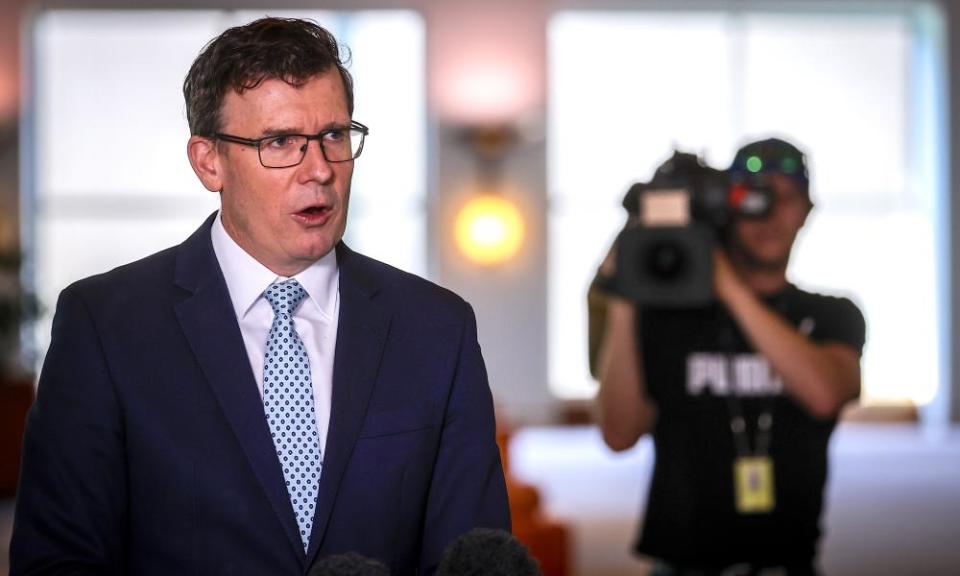Robodebt court documents show government was warned 76 times debts were not legally enforceable

The federal government was warned 76 times by a tribunal that Centrelink robodebts were not legally enforceable, according to court documents.
Gordon Legal claims that the dozens of judgments– which were previously hidden from public view – show the government knew the scheme was unlawful because it declined to appeal on every occasion.
In a fresh statement of claim filed days before a federal court trial, the firm also names government minister Alan Tudge among a handful of insiders said to be aware the program was flawed as early as January 2017.
Related: Australia's jobless to face mutual obligation rule despite few job vacancies
And it alleged several instances through 2017 and 2018 where top officials were made aware how people caught up in the program were threatening self-harm while on the phone to Centrelink staff.
The class action is set down for trial on Thursday, despite the government’s concession it will pay back $721m to people unlawfully accused of being overpaid benefits.
Gordon Legal is seeking interest payments and damages for the stress and inconvenience experienced by about 600,000 people who received debts, a larger group than the 370,000 people the government had agreed to pay back.
The firm is also now asking the court to impose exemplary damages to punish the government for its conduct running the scheme between 2015 and 2019.
It alleges the commonwealth was aware it was issuing unlawful debts, pointing to discussions between officials including Tudge in 2017 about the inaccuracy of its calculations. The commonwealth has roundly rejected the claim in pre-trial hearings.
In another new development, Gordon Legal also points to 76 decisions at the administrative appeals tribunal where robodebts were set aside because the calculations used by Centrelink “could not lawfully support the existence of a debt”.
The firm says in each case the commonwealth elected not to appeal and argues it is further proof that it knew the scheme was not legal. One of the 76 decisions was made in December 2019, after the government had already backed down on the scheme.
While these AAT decisions were never made public, if the government appealed it risked a higher tier of the tribunal ruling against it and publishing its judgement. Guardian Australia previously revealed the existence of five of these earlier decisions from 2017.
The first of the decisions against the government was handed down in February 2017 and the bulk made that year.
Many of the firm’s new claims centre around the knowledge of Tudge, who was responsible for human services in 2016-17, and top department officials from the period.
The firm says that on 1 March 2017 Tudge received a brief that stated “33% of Robodebt-raised debts ‘were changed to $0 on review/reassessment’”.
At the time, the government had staunchly defended the scheme in public, despite increasing warnings from experts and advocates published by the Guardian.
It is also suggested top officials within the Department of Human Services (DHS), now Services Australia, were being regularly notified of threats of self-harm among robodebt recipients.
The court documents reference a 13 July 2017 email in which department officials Malisa Golightly, Craig Storen and Tudge “received an email from within the Commonwealth that stated ‘a DHS recipient took their own life’ following receipt of Robodebt notification”.
In separate events, two mothers have alleged their sons took their own lives after receiving debts in 2017 and it is unclear whether the email relates to either of these cases. Government officials have previously denied the scheme was linked to suicides.
In August 2017, Jason McNamara, a senior manager at DHS, is said to have been informed of a robodebt letter recipient who threatened to self-harm or take their own life.
Gordon Legal claims documents viewed by McNamara state the man told Centrelink he “felt he was being unjustly targeted and had a plan to end his life”.
Among several instances was another case from October 2017 where Centrelink’s escalation team noted a robodebt letter recipient “was ‘distressed’ and ‘commented that he would self-harm and then terminated the call’”, the documents state.
After several government officials including Tudge were named at a case management hearing on Wednesday, lawyers for the Commonwealth said they would now consider whether to call witnesses for the trial.
It remains possible the two parties could reach a settlement.
The government has maintained it believed the scheme was legal until it received advice to the contrary in late 2019 following a legal challenge from Victoria Legal Aid.
Meanwhile, new data confirms the total value of unlawful demands issued through the scheme eventually topped $1.1bn.
Figures provided to a Senate committee show the government plans to “zero” $398.3m worth of debts, wiping demands where no money had been repaid.
Added to the $721m in refunds the government has announced, it takes the total value of unlawful debts issued throughout the four-year program to $1.12bn.
Related: 'Callous treatment': international students stranded in Australia struggle to survive
It confirms reporting in Guardian Australia from June, which revealed the value would certainly exceed $1bn, though it’s lower than estimates from the time which suggested it could reach $1.5bn.
Overall, about 531,000, or 68%, of the 771,576 debts issued since July 2015 will be either refunded or wiped.
The debts are being wiped because the government has conceded it cannot legally raise debts using the “income averaging” of a person’s annual ATO pay data.
The practice used calculations drawn from yearly pay to allege a person misreported their fortnightly income to Centrelink and was overpaid benefits.
• Crisis support services can be reached 24 hours a day: Lifeline 13 11 14; Suicide Call Back Service 1300 659 467; Kids Helpline 1800 55 1800; MensLine Australia 1300 78 99 78; Beyond Blue 1300 22 4636

 Yahoo News
Yahoo News 